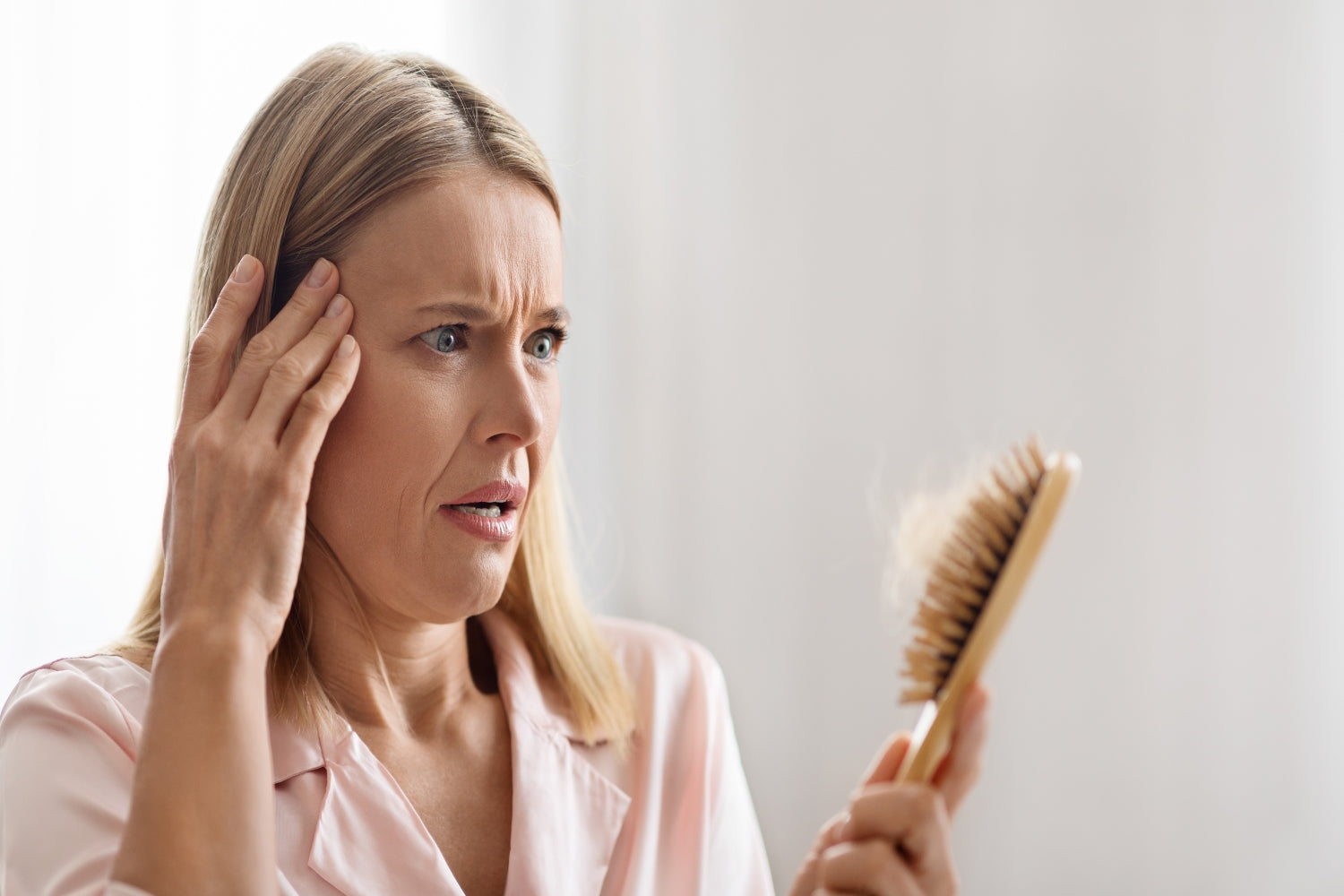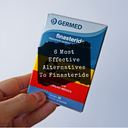Hair loss can be distressing at any age, but for many women around their 40s and 50s, it seems especially stressful.
As if dealing with hot spells, insomnia, and mood swings wasn't enough, now your hair is also thinning!
Women approaching their 40s often complain of noticing an increase in hair both on their brushes and down the drain in the shower. If you are going through this challenging phase, remember that you are not alone; 39% of women will experience hair thinning during their menopause transition.
But why does this period cause hair fall, and can you do anything about it? Grasping the link between perimenopause and hair loss is vital to avoid problems associated with this challenging period. Let's take a closer look at what happens in our bodies during perimenopause and how our hair changes.
Table of content
What is perimenopause?

Perimenopause, thus marking the phase of transition to menopause, is when a woman's body is preparing to reduce estrogen and progesterone production that control fertility.
This phase might last two years to even fourteen years as the ovaries were preparing to stop releasing eggs.
During perimenopause, estrogen and progesterone, which were initially high levels, begin to fluctuate and then decline. Thus, women suffer the result in the form of many symptoms such as hot flashes, night sweats, mood changes, difficulty sleeping, vaginal dryness, and irregular menstruation. Of course, hair may fall out too.
As your leading source for hair health information over the past 4 years, we never compromise on accuracy. When it comes to your health, you deserve information you can truly rely on - and earning your trust is our top priority.
Here's how Scandinavian Biolabs ensures every piece of content meets the highest standards of accuracy and integrity:
- Credentialed Experts: Our reviewers are actively practicing doctors and medical researchers
- Stringent Reviews: Content undergoes rigorous editing by subject specialists and review by a practicing doctor.
- Evidence-Based: We rely on well-established research from trusted scientific sources like peer-reviewed journals and health authorities.
- Full Transparency: Our editorial standards, writer credentials, reviewer credentials, correction process, and funding are all publicly documented.
- Independent Voice: While we do promote products, we operate in a vacuum to business operations. Our main goal is just an unwavering commitment to providing medically-sound guidance.
You can count on Scandinavian Biolabs to consistently deliver the trustworthy health information you deserve. Read our Editorial Standards.
The cycles of hair during perimenopause
During the period of menopause, which usually occurs in the forties, the ovaries start producing less estrogen and progesterone; thus, the body announces the coming end of reproductive years.
Nevertheless, this hormonal change is not only answerable to hot flashes or mood swings; instead, it can detour the hair growth cycle, diminishing the volume and density.
Estrogen is a major factor in hair care. It prolongs the growth phase, also known as the anagen phase, stimulates hair thickness, and decreases the rate of hair loss.
As this hormone decreases, the hair follicle begins to produce in response to a byproduct of testosterone, the androgen dihydrotestosterone (DHT). It may become more sensitive for women going through menopause, and the follicles begin to shrink, and the hair shaft contracts.
Simultaneously, with the fall in estrogen, progesterone levels also decrease. Progesterone levels usually peak after ovulation, which keeps hair in the resting or telogen phase longer. This occurs when the hair cycle is disrupted, leading to shedding. Some factors contributing to this include severe stress, illness, calorie restriction, thyroid hormone imbalances, and iron deficiency.
In some cases, however, these hormones can be the cause of hair loss. This is why some menopausal women develop facial “peach fuzz” and small sprouts of hair on the chin.
Then, when the dormant hairs are finally shed to make room for new growth, hair shedding increases, often leading to concerns about hair loss in women.
The most common types of hair loss during perimenopause
There are two main types of hair loss experienced during perimenopause:
Telogen Effluvium
Telogen effluvium (TE) is a common condition that will lead to hair loss. Hair naturally goes through growth, resting, and shedding phases. In TE, a stressful event disrupts this cycle by pushing early hair into the resting phase prematurely. This leads to increased hair shedding that wouldn't normally be lost yet. For example, menopausal symptoms can trigger TE.
What triggers telogen effluvium in perimenopause?
Hormones in a state of flux can really wreak havoc on the hair growth cycle, contributing to an increased number of hairs entering the telogen phase simultaneously.
This is often a direct result of:
- Estrogen Reduction: The decline of estrogen levels can prompt scalp and hair follicles to enter the resting phase and ultimately cause shedding.
- Stress and Anxiety: Emotional turmoil is a frequent companion during menopause and hair loss and can trigger TE.
- Nutritional Deficiencies: During this time, the body demands more nutrients, and a diet that's not up to the task can contribute to hair problems.
- Underlying Medical Conditions: Certain diseases can surface during perimenopause, and their accompanying treatments or stressors can result in TE.
Female pattern hair loss (androgenetic alopecia)

Androgenetic alopecia is another name for female pattern hair loss, which follows a different pattern than TE and is generally more chronic.
It is a gradual and androgenic type of hair loss that results in loss of hair, usually evident as a thinning part and a decline in total hair volume.
AGA occurs because of the intake of androgenic hormones, commonly known as male hormones, that women also produce.
Manly hormones, such as testosterone, when converted into a more powerful type of androgen, dihydrotestosterone (DHT), are responsible for the shrinking of the hair follicles. Therefore, the growth of shorter, thinner, lighter hairs begins.
Managing Androgenetic Alopecia
Unlike TE, managing AGA focuses more on slowing its advancement and working with existing follicles.
Minoxidil
This can be used directly on the scalp to promote hair growth and push the hair follicles into their longest productivity phase ( the anagen phase).
Nutritional Supplements
Biotin, which is a B-complex vitamin, and other supplements can help enhance the hair’s health and accelerate hair growth that is remaining.
Prescription Therapies
Some women with hair loss can be helped by drug prescriptions that have the effect of inhibiting DHT or altering its impact on the hair follicles.
Hair Grafting
If some cases are very critical, surgical hair restoration can be a solution to moving the healthy hair follicles to the bald parts.
How to prevent perimenopause hair loss?
There are several ways to address perimenopausal hair loss. Supplements like biotin and iron can support hair health. Hair loss shampoos and conditioners can gently cleanse and promote volume. Topical treatments like minoxidil may stimulate hair growth. Managing stress and ensuring a balanced diet rich in protein and vitamins can also be beneficial.
Here's how to prevent perimenopause hair loss:
Maintain a balanced diet
Ensure your dietary intake is rich in vitamins, minerals, and proteins that promote healthy hair growth. Foods such as avocados, salmon, tuna, flax oil, and green leafy vegetables provide essential nutrients like omega-3 fatty acids, biotin, and iron, which are crucial for robust hair and help reverse thinning hair during and after menopause.
Care for your hair and scalp to prevent fine hair
A healthy scalp is the foundation for good hair. It's important to know that regular, gentle exfoliation using natural scrubs and maintaining a clean environment can lead to hair regrowth and support the health of existing follicles. Beyond regular maintenance, addressing specific concerns like hair loss may require targeted treatments.
For example, menopausal hair loss happens due to hormonal changes, requiring the use of only best products for menopausal hair loss. By understanding and responding to their hair's unique needs, postmenopausal women can maintain a healthy, vibrant mane through all of life's stages.
Protect your hair from over-styling
Avoid or minimize the use of heat-styling tools and chemical treatments, especially if you have curly hair, such as dyes and relaxers, which can cause further damage. When styling, opt for heat-free methods and use protective, nourishing products to avoid hair breakage and brittle hair.
Minimize stress
Stress is a known factor that can exacerbate hair loss, especially since it is a symptom of menopause. Yoga, meditation, and hobbies can help manage stress levels and promote better overall health, including healthier hair during menopause.
Stay hydrated to stimulate growth
Hydration is essential for healthy hair. Make sure you drink plenty of water throughout the day and avoid dehydrating substances like caffeine and alcohol, which can lead to dry, brittle postmenopausal hair.
How to fix perimenopause hair loss?
Whether you're dealing with TE, AGA, or another form of hair loss, several natural and holistic approaches can help stabilize or reverse the condition. These include:
- Scalp Massage: Regular scalp massage helps facilitate blood circulation to the hair roots, thus creating a space that is favorable for regeneration.
- Essential Oils and Serums: Some hair protection oils and other essential oils, such as rosemary and peppermint, have shown the potential to improve hair density and growth. Our Bio-Pilixin Serum is a natural topical product capable of relieving hair thinning at the perimenopause stage. This extract is from the plant stems and strengthens hair follicles. In a clinical study, Bio-Pilixin Serum had a positive effect on hair loss and showed a 93% increase in hair density within 45 days of usage. Like scalp massage and essential oils, lifestyle transformation, and sun exposure reduction, the Bio-Pilixin Serum can be used to make up a variety of approaches aimed at hair thickness improvement.
- Lifestyle Adjustments: Ensuring you have a healthy work-life balance, adequate sleep, and regular exercise can contribute to overall well-being, which in turn supports healthy hair.
- Topical Treatments: Natural remedies to treat hair loss include aloe vera, or green tea can be applied topically to the scalp to reduce inflammation and encourage hair growth.
- You can also use low-light laser combs, helmets, or caps to prevent perimenopause hair loss.
Conclusion
It's important to know that hair goes through cycles of shedding and hair regrowth throughout our lives. Hair follicles begin to shrink with hormonal hair loss, affecting your hair growth cycle. This can cause hair loss and affect hair strands, as well as the overall hair becomes thinner.
Women notice hormonal changes, such as increased shedding and overall hair thinning, due to fluctuations in female sex hormones. It's crucial to learn about the causes of female hair loss as hormonal roller coaster impact hair follicle cells, leading to general thinning and changes in body hair.
Additionally, hair follicles also play a significant role in helping hair to grow, and experiencing hair loss can be distressing for many.
FAQs
What supplements are good for menopause hair loss?
Several supplements may be helpful for hair loss during menopause. These include biotin, iron, vitamin D, vitamin C, zinc, and omega-3 fatty acids. A comprehensive multivitamin can address deficiencies in these key nutrients. Consider consulting a healthcare provider to discuss your specific needs and get personalized advice.
How can I stop hair loss during menopause?
Menopausal hair loss can be addressed through a combination of approaches. Nutrient-rich supplements can support hair health from within. Look for ingredients like biotin and collagen. Additionally, using shampoos and conditioners formulated for menopausal hair can gently cleanse and promote volume. Topical treatments like minoxidil may also be helpful. Consulting a doctor or dermatologist can help determine the best course of action for your hair loss.
Is there anything we can do to prevent perimenopausal hair loss or hair thinning?
Perimenopausal hair loss can be addressed through lifestyle changes and dietary adjustments. Ensuring adequate protein intake and maintaining a healthy diet rich in vitamins and minerals provide the building blocks for healthy hair growth. Managing stress levels can also be beneficial. If you suspect a nutrient deficiency, a multivitamin or targeted supplements like biotin may be helpful. Consulting a healthcare provider can help identify underlying causes and recommend personalized strategies.
What is the best treatment for perimenopause?
There isn't a single "best" treatment for perimenopause, as symptoms vary among women. Hormone replacement therapy (HRT) is a common approach that can alleviate symptoms like hot flashes, night sweats, and vaginal dryness. However, HRT may not be suitable for everyone. Lifestyle changes like stress management, regular exercise, and a balanced diet can significantly improve perimenopausal symptoms. Consulting a doctor or gynecologist is crucial to develop a personalized treatment plan that addresses your specific needs and preferences.
Source
- Brinton RD, Yao J, Yin F, Mack WJ, Cadenas E. Perimenopause as a neurological transition state. Nat Rev Endocrinol. 2015 Jul;11(7):393-405. doi: 10.1038/nrendo.2015.82. Epub 2015 May 26. PMID: 26007613; PMCID: PMC9934205.
- Zouboulis CC, Blume-Peytavi U, Kosmadaki M, Roó E, Vexiau-Robert D, Kerob D, Goldstein SR. Skin, hair and beyond: the impact of menopause. Climacteric. 2022 Oct;25(5):434-442. doi: 10.1080/13697137.2022.2050206. Epub 2022 Apr 4. PMID: 35377827.
- Kamp E, Ashraf M, Musbahi E, DeGiovanni C. Menopause, skin and common dermatoses. Part 1: hair disorders. Clin Exp Dermatol. 2022 Dec;47(12):2110-2116. doi: 10.1111/ced.15327. Epub 2022 Oct 28. PMID: 35796569; PMCID: PMC10092469.
- Ablon G, Kogan S. A Randomized, Double-Blind, Placebo-Controlled Study of a Nutraceutical Supplement for Promoting Hair Growth in Perimenopausal, Menopausal, and Postmenopausal Women With Thinning Hair. J Drugs Dermatol. 2021 Jan 1;20(1):55-61. doi: 10.36849/JDD.5701. PMID: 33400421.
- Ablon G, Kogan S, Raymond I. A Long-Term Study of the Safety and Efficacy of a Nutraceutical Supplement for Promoting Hair Growth in Perimenopausal, Menopausal, and Postmenopausal Women. J Drugs Dermatol. 2022 Jul 1;21(7):783. doi: 10.36849/JDD.776. PMID: 35816069.
- Santoro N. Perimenopause: From Research to Practice. J Womens Health (Larchmt). 2016 Apr;25(4):332-9. doi: 10.1089/jwh.2015.5556. Epub 2015 Dec 10. PMID: 26653408; PMCID: PMC4834516.







